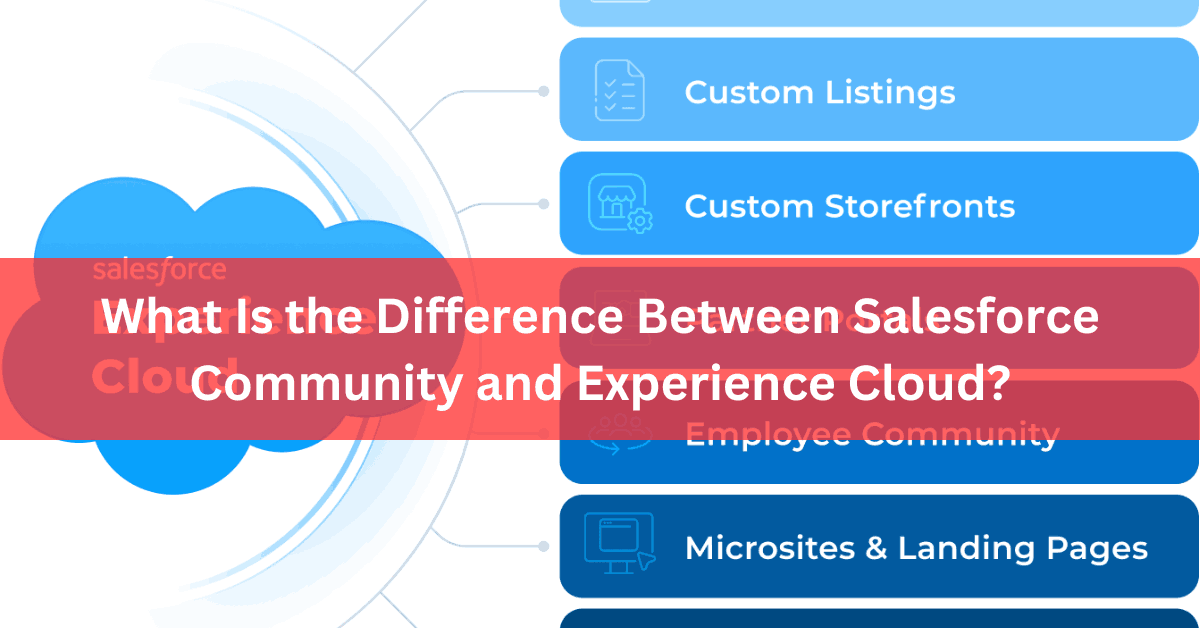What Is the Difference Between Salesforce Community and Experience Cloud?
Salesforce provides an array of customer relationship (CRM) tools that enhance customer relationships and streamline business processes. The community cloud and the experience cloud are two Salesforce platforms that offer overlapping functionalities yet distinctive capabilities.
While the community cloud excels at self-service, the experience cloud excels at omnichannel support and analytics. Here are some differences between community cloud and salesforce experience cloud:
Customization and Personalization
Salesforce community cloud allows businesses to create personalized, branded communities that cater to their customers, partners, and employees. It fosters a sense of belonging among users by providing a platform for interaction and collaboration. Users can share information, discuss topics, and contribute to the community, promoting ownership and engagement.
The platform’s ability to be customized to align with the business’s branding enhances its appeal to users. The experience cloud takes customization and personalization to a whole new level. It allows companies to create tailored digital experiences that extend beyond communities.
These may include websites, portals, and mobile applications. Each digital experience can be personalized to cater to different user groups. Customization and personalization drive higher engagement and satisfaction among users, which fosters improved relationships between the business and its customers, partners, and employees.
Engagement
Salesforce community cloud provides a platform that encourages direct communication and collaboration among users. Allowing users to share information, answer queries, and engage in discussions fosters a sense of community and promotes active participation. It also bridges the gap between the business and its customers, partners, and employees, facilitating two-way communication and feedback.
Salesforce Experience Cloud takes user engagement further by creating immersive digital experiences that drive user interaction and involvement. Personalized content, streamlined workflows, and intuitive interfaces encourage users to interact more deeply with the business.
The platform’s ability to create engaging digital experiences that resonate with users helps to increase user satisfaction, loyalty, and advocacy. Businesses usually leverage these enhanced engagement capabilities to build improved user relationships and drive better business outcomes.
Integration
Salesforce community cloud provides seamless integration with other Salesforce products, allowing businesses to leverage their existing data within their communities. This helps deliver a more personalized and relevant user experience, enhancing engagement and satisfaction.
The experience cloud takes integration capabilities to a higher level. It allows businesses to connect various data sources and embed them directly within their digital experiences. Users can access real-time, connected data from multiple sources within the same interface.
This delivers a more comprehensive and contextually relevant experience. The platform’s advanced integration capabilities enhance user productivity and decision-making processes, making it a valuable tool for businesses aiming to deliver superior digital experiences.
Self-Service
Salesforce community cloud provides a platform where users can find answers to their queries, reducing the need for customer service. This enhances user satisfaction and reduces the burden on customer service teams, resulting in improved efficiency and cost savings.
The experience cloud offers advanced self-service options within its digital experiences. These include personalized content, automated workflows, and intelligent search capabilities, allowing users to find the information quickly and easily.
Empowering users to serve themselves enhances user satisfaction and reduces reliance on customer service teams. This leads to increased efficiency, reduced costs, and improved customer experiences.
Omnichannel Support
Salesforce community cloud focuses on creating communities, while the experience cloud supports a broader range of digital touchpoints. It allows businesses to create a variety of digital interfaces, including websites, portals, and mobile apps.
This omnichannel approach fosters a consistent user experience across all touchpoints, enhancing user satisfaction and loyalty.
The omnichannel capabilities of the experience cloud allow businesses to deliver a unified and seamless user experience across devices or channels. Users can expect a consistent, high-quality experience, increasing engagement and satisfaction.
Analytics
While the community cloud provides basic analytics capabilities, the experience cloud offers more advanced analytics. Businesses can track user behavior, engagement levels, and other key metrics across their digital experiences. These insights can be used to optimize the user experience, drive better outcomes, and make data-driven decisions.
The advanced analytics capabilities of the experience cloud provide businesses with a deeper understanding of their users’ needs and behaviors. By leveraging these insights, companies can improve their digital experiences, delivering more value to their users and improving business outcomes.
Accelerate Your Digital Transformation with Salesforce Experience Cloud
While the Salesforce community cloud and the Salesforce experience cloud have similarities, the latter offers more advanced features and capabilities. Experience Cloud allows businesses to create personalized, integrated, engaging digital experiences across multiple touchpoints.
Embrace the future of digital transformation by investing in Salesforce experience cloud and elevating your business to new heights.




